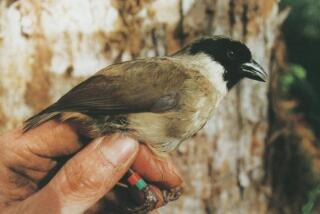As Earth’s Riches Decline, So Do Its Healing Powers : Science: The planet is caught in an ongoing extinction ‘event’ that threatens species mankind doesn’t even know exist, author says.
- Share via
This may sound apocalyptic, but famed ant expert and author Edward O. Wilson warns bluntly that “the sixth great extinction spasm of geological time is upon us, grace of mankind.”
Only during rare instances in this planet’s 4.6-billion-year history have species been driven into extinction as rapidly as they are now, Wilson observes in his new book, “The Diversity of Life.”
Extinctions of the past--such as the great die-off recorded in fossils and rocks from 65 million years ago--were cataclysmic, probably caused by the impact of a huge meteorite or by massive volcanic eruptions. The insidious extinction event that is under way now, which accelerated greatly with the Industrial Revolution, could be as lethal, if a bit slower.
Wilson, founder of the discipline of sociobiology, professor of science at Harvard and winner of two Pulitzer Prizes for his writing, warns that because of bulldozers, chain saws, smokestacks, garbage, rampant population growth and the like, “Earth has at last acquired a force that can break the crucible of diversity.”
In the tropical rain forests alone, for example, where more than half of the world’s species live, he said, “the rate of depletion of species has been estimated to be on the order of one-half of 1% per year.”
Worse, nobody even knows what species are there, so no one knows what is being lost. Natural chemicals that might serve as curative drugs, new sources of food and potentially new industrial products are there, but no one has identified or studied them. And once extinct, they are probably gone forever.
As conditions get worse, as the human population expands and pollution gets thicker, he wrote, “the way back seems harder every year.”
What to do?
First, he said, the value of diversity--biological richness--must be recognized. “The essence of the biodiversity problem is that biological wealth is taken much less seriously” than the value of material and cultural goods.
“This,” he said, “is a major strategic error, one that will be increasingly regretted as time passes. Diversity is a potential source of immense untapped material wealth in the form of food, medicine.” One simple example: the Pacific yew, formerly a trash tree in Pacific Northwest forests, is the source of taxol, a new anti-cancer drug.
To address the biodiversity problem, Wilson’s proposals include:
* Surveying the world’s fauna and flora. “Biologists are close to traveling blind. They have only the faintest idea of how many species there are on Earth or where most occur; the biology of more than 99% remains unknown.”
* Creating biological wealth. “Every community of organisms contains species with potential commodity value--timber and wild plant products to be harvested on a sustained basis . . . seeds and cuttings . . . fungi and microorganisms to be cultured as sources of medicinals . . . and organisms of all kinds offering new scientific knowledge.”
* Promoting sustainable development. “The rural poor of the Third World are locked into a downward spiral of poverty and the destruction of diversity. They need work that provides the basic food, housing and health care taken for granted by a great majority of people in the industrialized countries.”
* Saving what remains: “Could new species be created in the laboratory after genetic engineers have learned to assemble life from raw organic compounds? It is doubtful. There is no assurance that organisms can be generated artificially, at least not any as complex as flowers or butterflies--or amoebas for that matter. . . . This is not the time for science-fiction dreams.”






